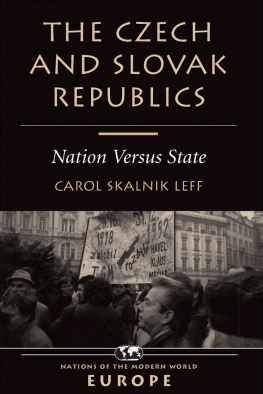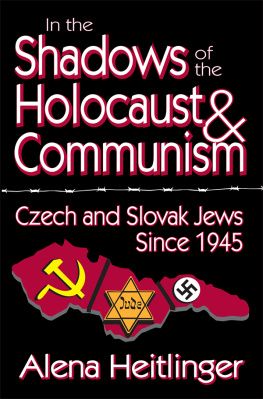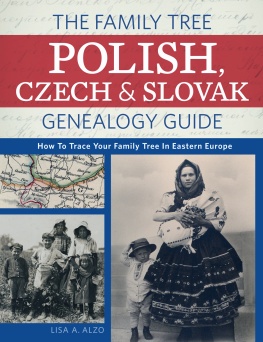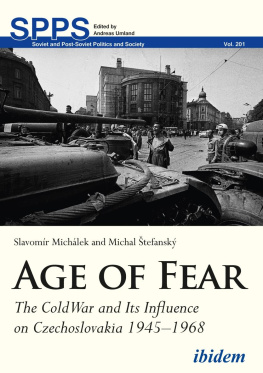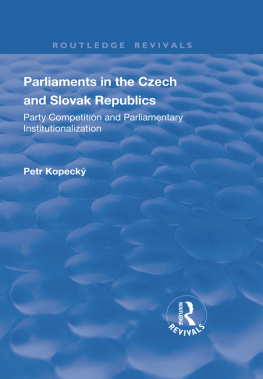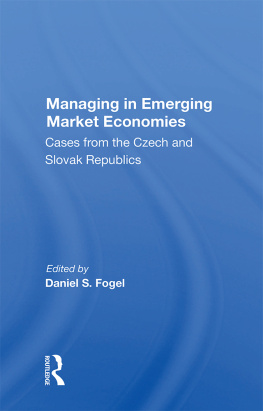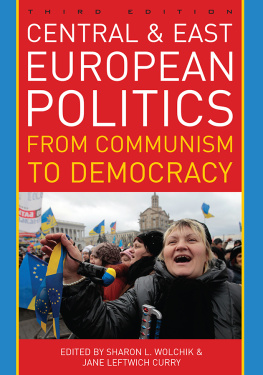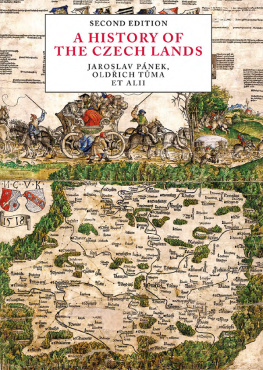THE CZECH AND SLOVAK REPUBLICS
Nations of the Modern World: Europe
edited by W. Rand Smith and Robin Remington
This series examines the nations of Europe as they adjust to the changing world order and move into the twenty-first century. Each volume is a detailed, analytical country case study of the political, economic, and social dynamics of a European state facing the challenges of the post-Cold War era. These challenges include changing values and rising expectations, the search for new political identities and avenues of participation, and growing opportunities for economic and political cooperation in the new Europe. Emerging policy issues such as the environment, immigration, refugees, and reordered national security priorities are evolving in contexts still strongly influenced by history, geography, and culture.
The former East European nations must cope with the legacies of communism as they attempt to make the transition to multiparty democracy and market economies amid intensifying national, ethnic, religious, and class divisions. West European nations confront the challenge of pursuing economic and political integration within the European Union while contending with problems of economic insecurity, budgetary stress, and voter alienation.
How European nations respond to these challenges individually and collectively will shape domestic and international politics in Europe for generations to come. By considering such common themes as political institutions, public policy, political movements, political economy, and domestic-foreign policy linkages, we believe the books in this series contribute to our understanding of the threads that bind this vital and rapidly evolving region.
The Czech and Slovak Republics: Nation Versus State , Carol Skalnik Leff
Great Britain: Decline or Renewal? Donley Studlar
Spain: Democracy Regained , Second Edition, E. Ramn Arango
Denmark: A Troubled Welfare State , Kenneth E. Miller
Portugal: From Monarchy to Pluralist Democracy , Walter C. Opello, Jr.
FORTHCOMING
Albania , Elez Biberaj
Austria , Anton Pelinka
The Netherlands , Thomas R. Rochon
The Politics of Belgium , John Fitzmaurice
Ireland: The Challenge of Conflict and Change , Second Edition, Richard B. Finnegan
Modern Greece , Keith R. Legg and John Roberts
France: Grandeur or Decline? W. Rand Smith
Germany , W. Donald Hancock and Henry Krisch
Italy , Patrick McCarthy
Switzerland , Ulrich Kloti
Nations of the Modern World: Europe
First published 1997 by Westview Press
Published 2018 by Routledge
711 Third Avenue, New York, NY 10017, USA
2 Park Square, Milton Park, Abingdon, Oxon OX14 4RN
Routledge is an imprint of the Taylor & Francis Group, an informa business
Copyright 1996 Taylor & Francis
All rights reserved. No part of this book may be reprinted or reproduced or utilised in any form or by any electronic, mechanical, or other means, now known or hereafter invented, including photocopying and recording, or in any information storage or retrieval system, without permission in writing from the publishers.
Notice:
Product or corporate names may be trademarks or registered trademarks, and are used only for identification and explanation without intent to infringe.
Library of Congress Cataloging-in-Publication Data
Leff, Carol Skalnik.
The Czech and Slovak republics: nation versus state / by Carol Skalnik Leff.
p. cm. (Nations of the modern world. Europe)
Includes bibliographical references and index.
ISBN 0-8133-2921-3 ISBN 0-8133-2922-1 (pbk.)
1. CzechoslovakiaPolitics and government19451992.
2. Czech RepublicPolitics and government. 3. SlovakiaPolitics
and government. 4. Post-communismCzech Republic. 5. Post
communismSlovakia. 6. CommunismCzechoslovakia. I. Title.
II. Series.
DB2238.7.L44 1997
320.9437dc20 96-12080
CIP
ISBN 13: 978-0-8133-2922-2 (pbk)
No one writes any book alone, however much colleagues, friends, and family may sometimes wish that could be the case. I owe thanks to my colleagues in the political science department and in the Arms Control, Disarmament, and International Security (ACDIS) program at the University of Illinois for their comments on the theoretical issues raised by the postcommunist democratization process, particularly Ed Kolodziej, Roger Kanet, Paul Quirk, and Gerardo Munck. Robin Remington deserves heartfelt appreciation for her scholarship, friendship, and insight in ways that go far beyond her editorship of this series. Special thanks to Andrew Green and John Lepingwell for the temporary diversion from their own research agendas to lend help with invaluable Internet resources; to James Krapfl for his close and intelligent reading of much of the manuscript; and above all to my familAlison, Ben, and Markwho allowed me to order them around like a drill sergeant during the final phases of the manuscript's preparation. I hope I've made it up to you. Finally, there are always people who richly deserve thanks for advice and support but who are unaccountably left unmentioned. You know who you are, and my appreciation is nonetheless sincere for the omission.
Carol Skalnik Leff

